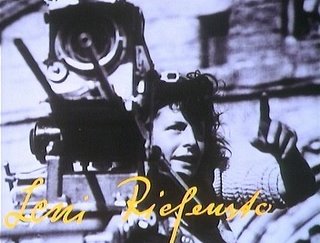
Women Filmmakers 101:
Leni Riefenstahl
Though she will always be known for her artistic propaganda masterpiece Triumph of the Will / Triumph des Willens, Leni Riefenstahl danced, acted, directed, photographed, and wrote books for much of the twentieth century. Her association with Adolf Hitler and the Nazis tainted her achievements during her lifetime, but she was a creative genius and she lived to be 101 years old. Talent is not always politically correct, nor necessarily good -- a fact worth remembering. Leni's full name, rarely used, was Bertha Helene Amalie Riefenstahl (Berlin, 8/22/1902-9/8/2003). To say that she was a survivor is an understatement. Lucky and resilient, she survived the Second World War and continued to create until her death; since then, many of her films have been released on DVD, and her entire body of work is being reevaluated for its intrinsic technical value.
How did Riefenstahl become a pioner woman movie director? She sort of stumbled into it. Her first love was dancing, but after a bad knee injury, she had to do something else. After a sojourn in the Alps, she petitoned for work as an actor, and succeeded with panache, acting in several silent films during the 1920s and early 1930s. Acting became a springboard for directing, which resulted in her first film, Das Blaue Licht / The Blue Light (1932). She also acted in this 72 minute film, co-wrote the screenplay, and benefited from the craft and vision of co-director Béla Balázs (1884-1949), a Jewish Hungarian film expert.
When Hitler came to power, Riefenstahl made Der Sieg des Glaubens / Victory of Faith (1933), a 61-minute documentary showcasing the pomp and ceremony of various Nazis. What's remarkable about her work is how seamlessly she moved from one genre form to another as if such distinctions and labels didn't matter in the least.
 Riefenstahl's most important work in terms of impact was Triumph of the Will (1934/1935) which must be seen to be appreciated. It was scarily good in achieving what she and Hitler sought to do: aggrandize Germany under the Nazis.
Riefenstahl's most important work in terms of impact was Triumph of the Will (1934/1935) which must be seen to be appreciated. It was scarily good in achieving what she and Hitler sought to do: aggrandize Germany under the Nazis.A useful documentary about this early woman film director is The Wonderful, Horrible Life of Leni Riefenstahl / Die Macht der Bilder: Leni Riefenstahl (1994), directed by Ray Müller. We will be able to learn a great deal more about her legacy in the coming years.
Riefenstahl is another prime -- if grim -- answer to Woody Allen's Match Point (2005) question: is it better to be lucky than good? But is this a fair assessment? Hard to tell. There but for the grace of God. She became a bit strange after the war (having married a German officer in 1944) and spent much of her time in Africa or in studying underwater sea creatures. She became a prized photographer and was sought after by numerous magazines and celebrities, who acknowleded her importance and abilities despite the "unfortunate period" of her career. It will be interesting to see how she's treated now that she's no longer living among us.
Congrats to post-Berlusconi Italy for winning the World Cup, defeating France in overtime. Ciao!







4 comments:
Interesting thoughts on Triumph of the Will. If art is evil, is it still art? That's a great question. Thanks for the thoughtful post.
Art? Evil? Nah.... interesting post today
Here is reason not to associate with politicians. I wonder what she would have thought about today's technology--with independent film makers and digital everything.
Very interesting post, Erik. A website you might find interesting as well: http://www.sensesofcinema.com/index.html and a list of the Criterion Collection: http://www.criterionco.com/asp/browse.asp --R
Post a Comment